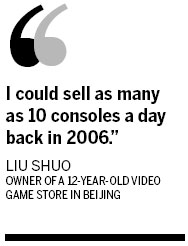Ban on games consoles may be lifted, suggests Culture Ministry source
Updated: 2013-01-28 05:45
By Shen Jingting (China Daily)
|
||||||||
Chinese authorities are reviewing a decade-long ban on game consoles and considering the possibility of opening up the country's video game hardware market, a government source told China Daily.
Because of fears of the potential harm to the physical and mental development of the young, seven Chinese ministries collectively banned the manufacture, sale and import of game consoles in China in 2000.
Major game console vendors across the world, including Microsoft Corp, Nintendo Co and Sony Corp, made several attempts but failed to find a way to enter the Chinese mainland market officially.
"We are reviewing the policy and have conducted some surveys and held discussions with other ministries on the possibility of opening up the game console market," a source from the Ministry of Culture, who asked not to be named, said.
"However, since the ban was issued by seven ministries more than a decade ago, we will need approval from all parties to lift it," the source said.
Rumors have circulated in the Chinese media that some international companies have already sensed the government's changing attitude. They hope to figure out the Chinese authorities' intentions so they can make a rapid response, analysts said.
Sony Computer Entertainment (SCE), a subsidiary responsible for Sony's PlayStation business, set up a branch in South China's Guangdong province in June last year. The Guangdong branch will conduct training and research and development work for Sony.
Microsoft introduced its Kinect, a controller-free game console, to the Chinese mainland in October last year. However, Zhang Yaqin, chairman of Microsoft Corp's Asia-Pacific Research and Development Group, said Kinect is not used for games in China but for other purposes, such as medical treatment and education.

"Kinect's entry into China does not mean Microsoft's game console has come to China. Currently, we don't have a timetable for our game consoles entering the Chinese market. It needs government's approval," Zhang told China Daily at the end of last year.
Zhang has frequently expressed Microsoft's eagerness to bring game console products to the mainland. "We hope to launch the Xbox (in the mainland market) as soon as possible," Zhang said at the China Digital Entertainment Expo and Conference (Chinajoy), an online gaming fair in Shanghai.
Although China is the world's biggest manufacturing base for Microsoft's Xbox game console, the product suffers from both market inaccessibility and piracy problems in China.
Among participants who wish to grab a share of China's massive video gaming market, Beijing Eedoo Technology Ltd, a spin-off company from Lenovo Group, has been a front-runner.
Beijing Eedoo successfully launched a multimedia entertainment console in the mainland market in April last year. But the company has changed the product name several times in order to avoid sensitive issues.
Jack Luo, chief executive officer of Beijing Eedoo, insisted his company is selling a "sports and entertainment machine", rather than a game console, to Chinese families.
The decade-long ban also prompted a prosperous illegal game console market in China.
Situated at the northern end of the central axis of Bejing's inner city, the Gulou (Drum Tower) area is known as a distribution center for smuggled game consoles such as Xbox, PlayStation and Wii, as well as its historical and hutong charms.
Liu Shuo, who runs a 12-year-old video game store on East Gulou Street, is one of the many beneficiaries of the ban.
In 2000, Sony's PlayStation 2 became a worldwide hit soon after its debut owing to the company's groundbreaking technology in improving the gaming interface and playability. Foreseeing the huge market potential on the Chinese mainland, Liu made his first pot of gold by reselling smuggled PlayStation consoles.
"There were wholesale dealers transferring PlayStation consoles from Japan, South Korea and Hong Kong. All you had to do was find them and resell their products," said Liu.
The sales of game consoles reached a peak between 2006 and 2010, when Nintendo and Microsoft successively launched their motion sensing consoles, allowing the players to interact with and manipulate images on the screen via gesture recognition.
"I could sell as many as 10 consoles a day back in 2006. The net profit was high because there were fewer competitors," said Liu.
As the "transfer" industry chain matures, video game stores have sprung up in many first- and second-tier cities. East Gulou Street's golden days are now in the past.
"Now buyers can get access to game consoles in every major electronics market near their homes but old customers know we are still selling video games here," Liu said.
Pan Jiayuan and Chen Limin contributed to this story.
shenjingting@chinadaily.com.cn
(China Daily 01/28/2013 page17)

 In Photos: 7.0-magnitude quake hits Sichuan
In Photos: 7.0-magnitude quake hits Sichuan
 Li Na on Time cover, makes influential 100 list
Li Na on Time cover, makes influential 100 list
 FBI releases photos of 2 Boston bombings suspects
FBI releases photos of 2 Boston bombings suspects
 World's wackiest hairstyles
World's wackiest hairstyles
 Sandstorms strike Northwest China
Sandstorms strike Northwest China
 Never-seen photos of Madonna on display
Never-seen photos of Madonna on display
 H7N9 outbreak linked to waterfowl migration
H7N9 outbreak linked to waterfowl migration
 Dozens feared dead in Texas plant blast
Dozens feared dead in Texas plant blast
Most Viewed
Editor's Picks

|

|

|

|

|

|
Today's Top News
Live report: 7.0-magnitude quake hits Sichuan, heavy casualties feared
Boston suspect cornered on boat
Cross-talk artist helps to spread the word
'Green' awareness levels drop in Beijing
Palace Museum spruces up
First couple on Time's list of most influential
H7N9 flu transmission studied
Trading channels 'need to broaden'
US Weekly

|

|







